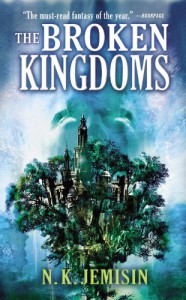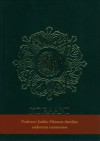rameau's ramblings
A reader who’ll try anything once, including bad books in search of good ones. Eclectic as her tastes are, she tends to gravitate to historical romances, realistic contemporaries, and some fantasy novels.
The Broken Kingdoms (The Inheritance Trilogy #2) by N.K. Jemisin

The ending ruined it for me. I was all set to give this book a better rating than The Hundred Thousand Kingdoms despite my misgivings, but then the ending happened and it fell flat on its arse like a granny on spring ice. And it hurt.
Spoilers ahead for The Hundred Thousand Kingdoms and The Broken Kingdoms.
As the succession competition was an ostensible plot for Yeine's book, the disappearance and deaths of godlings is for Oree's. Oree is a woman plagued by gods. She is blind but can see magic. She's also self-sufficient and isn't afraid to stand up to a god. Oree also has a houseguest called Shiny, who keeps dying and coming back to life.
I liked Oree even though I had my doubts about her magical vision. I even liked the pseudo-plot that directed her character development until it turned a tad too manipulative for my taste. I don't mean I disliked how Oree was manipulated—though that's apt too—but that I disliked the manipulative quality of the writing.
Jemisin doesn't preach overtly the message she wants to convey, instead she shows the utter ugliness of a recognisable situation and allows the readers to have that epiphany on their own. This is what authors should do. The trouble is, again because of a personal history, that I am highly allergic to such methods. My instinctive reaction is to run to the exact opposite direction. This is why I was bemoaning that I couldn't appreciate such skilled writing on a more visceral level.
When I realised this book was going to be about Itempas and his punishment, I clapped my hands with glee. There's nothing I like better than seeing the villain of one story turn into the anti-hero—if not a hero—of another.
Only, The Broken Kingdoms isn't about Itempas, it's about a mortal woman who falls in love with him. And that's the problem. I don't think Jemisin can write a convincing story about two people falling in love. She can write a complex story about people who have been in love, who still love each other but can't be together. She can write about a complicated friendship that's more than borrowing the neighbour's sugar and swapping gossip, where two people sleep in the same bed but don't have sex. She can write about huge families where someone has done an unforgivable crime, but is loved and hated in equal measure. She can't write about platonic affection turning into a sexual attraction, not believably anyway, not in here.
I'm aware that these are gods involved and that they are different, that they should be different. Still, if gods are given human emotions and temperaments, they should act recognisably human. I as a reader should be able to connect with them enough to empathise and believe when they claim to be in love. I bought Shiny's fatherly feelings towards the godlings, I bought his regret to a certain extent, I bought his friendship with Oree, but not at any time did I believe he wanted her.
Then there was the ending. To add insult to injury Jemisin writes what should be a gut-wrenching ending to Oree and Shiny's relationship and turns it into a trope bait.
It appears that the first person voice narration is going to be a longstanding problem for me with Jemisin's work. I can understand why the author would choose to tell a story—this particular story even—through a single character, but I don't think anything can make me like it.
 2
2




